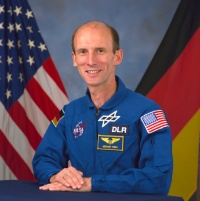Gerhard P.J. Thiele
From The Space Library
 Gerhard P.J. Thiele | |
| Birth Name | Gerhard P.J. Thiele |
|---|---|
| Birth Date | Sept 2 1953 |
| Occupation | Astronaut, European Space Agency |
Contents |
[edit] Personal Data
Born September 2, 1953, in Heidenheim-Brenz, Germany. Considers Bruhl, Nordrhein-Westfalen, to be his hometown. He is married and has four children. Recreational interests include cooking, music, reading and sports, especially Badminton. He enjoys his profession, and spending time with his family.
[edit] Education
Completed final high school examination at Friedrich-Schiller-Gymnasium in Ludwigsburg ; studied physics at Ludwig-Maximilians Universitat in Munich, and at Ruprecht-Karls-Universitat in Heidelberg,from 1976 to 1982; received his doctorate at the Institute for Environmental Physics of Heidelberg Universitat, in 1985.
[edit] Experience
Thiele served with the navy of the German Federal Armed Forces from 1972 to 1976 as operations/weapons officer aboard fast patrol boats. While completing his doctoral thesis, Thiele was a research assistant at the Institut fur Umweltphysik (Institute for Environmental Physics), Universitat of Heidelberg. He then completed post-doctoral research at Princeton University from 1986 to 1987. His main interests in research activities focused on global ocean circulation and its implications on climate development. He has authored and co-authored publications in the field of geophysics and oceanography as well as psychology.
[edit] Spaceflight Experience
NASA/ESA EXPERIENCE: In 1988, Thiele began basic astronaut training at DLR (German Aerospace Research Establishment). Upon completion in 1990, he was assigned to the German D-2 Spacelab Mission. In 1992, he reported to the Johnson Space Center where he trained with the crew as back-up payload specialist. During the STS-55/Spacelab D-2 Mission (April 26 to May 6, 1993), Thiele served as alternate payload specialist in the Payload Operations Control Center of DLR at Oberpfaffenhofen. In 1994, he served with the Strategic Planning Group for the Program Director of DLR. Since 1994 he has served as an active member for the International Academy of Astronautics Subcommittee on Lunar Development. In 1995, he was assigned to head the Crew Training Center (CTC) at DLR in Cologne. In July 1996, DARA (German Space Agency) and DLR (German Aerospace Research Establishment) selected Thiele to attend NASA's mission specialist class 1996 at the NASA Johnson Space Center (JSC) in Houston, Texas, where he qualified, after two years of training and evaluation, for flight assignment as a mission specialist. He was initially assigned technical duties in the Astronaut Office Computer Support Branch and led the development of a new class of computer based training courses. In August 1998, he joined the European Astronaut Corps of the European Space Agency, whose home base is the European Astronaut Centre in Cologne, Germany. Following his flight, Thiele was assigned by NASA for collateral duties as a CAPCOM, the interface in charge of communications, between the Control Center and the Space Shuttle crew. This was the first time this position had been assigned to a European astronaut. Since August 2001, Gerhard Thiele is serving as Head of the ESA astronauts and Operations Unit at EAC in Cologne. In addition, he was acting Head of the Astronaut Division from August 2002 until April 2003. In January 2003, Gerhard Thiele was assigned as backup of Andre Kuipers for the Soyuz 8S mission. He started training at Yuri A. Gagarin Cosmonaut Training Centre GCTC ( Star City ) near Moscow in May 2003. SPACE FLIGHT EXPERIENCE: From February 11-22, 2000, Thiele participated as mission specialist in the STS-99 Mission. The Shuttle Radar Topography Mission (SRTM) was dedicated to the first, three-dimensional, digital mapping of the Earth surface on a nearly global scale. He was responsible for SRTM operations, including the deployment and retraction of the 200-foot high boom from Endeavour's cargo bay upon which one of the flight's radar systems was mounted. Thiele was also one of two spacewalking crew members, in the event contingency spacewalk would have been required during the flight. The STS-99 mission was accomplished in 181 Earth orbits, traveling over 4 million miles in 268 hours and 38 minutes.
[edit] Organizations
Member of Deutsche Physikalische Gesellschaft (German Physical Society), American Geophysical Union, Weltraumforum Aachen at Rheinisch-Westfalische Technische Hochschule, Aachen and Member of the IAA ( International Academy of Astronautics) Subcommittee on Lunar and Mars Development (1998).
[edit] Special Honours
Federal Cross of Merit of the Federal Republic of Germany, 1st Class (1993). Medal of Merit of Baden-Wurttemberg (2001), NASA Space Flight Medal (2000), American Astronautical Society Flight Achievement Award (2000) with STS-99 crew.
[edit] Other Information
Aug-07
